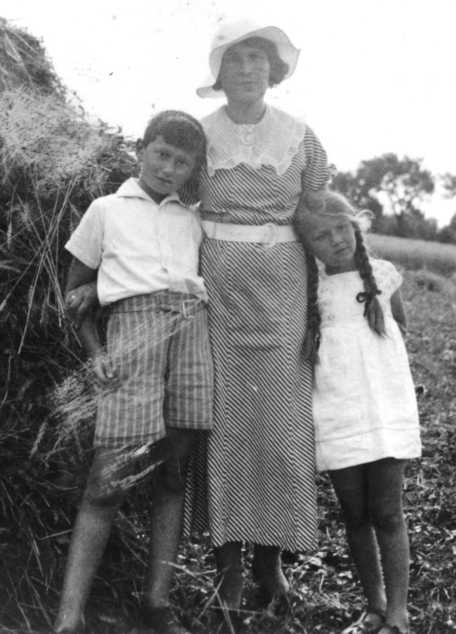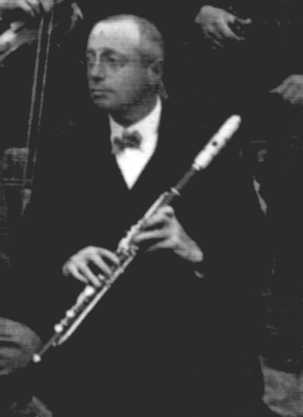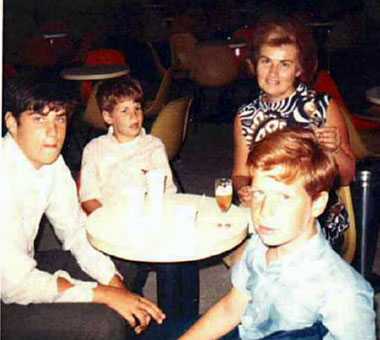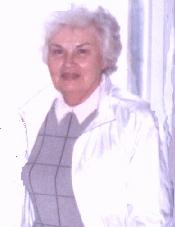 |
||||||||||||||||||||
|
|
||||||||||||||||||||
 |
A Horodenka Holocaust Memoirby Tosia Szechter Schneider (1998) Once again I am called on to fulfill the pledge I made to my mother during the bitter winter of 1942, to tell the world, should I survive. It was not an easy pledge to keep, not because telling and retelling the story is still a painful task, but because few people wanted to hear, and we survivors found no suitable words to express the horror. Koheleth tells us, that "there is nothing new under the sun". He was wrong, such bestiality has never been seen under the sun. Murder on such a scale defies imagination: 6 million killed, 1 million of them children! Half a century has passed since those dark days and historians and ordinary people are taking a greater interest in that period. Perhaps it took that long for the world to be able to deal with it and for us, the survivors, to realize that the number of eyewitnesses is dwindling and that the story must be told. I would like to tell you what happened to one family, in one little town in eastern Poland, not because there was something extraordinary about their life or their death, on the contrary, what happened to them was repeated in thousand of towns and villages across Poland. Jews had lived in Poland for a thousand years and in our little town of Horodenka since the 17th century. Here are some of the statistics: Population: app. 10,000, Jews 50%, Ukrainians 40%, and Poles 10% Region: rich agricultural land Exports: grain, cattle, and dairy products to all over Europe Industry: sugar factory, flourmill, and dairies Occupations of Jews: tailors, carpenters, shoemakers, furriers, tanners, merchants, lawyers, doctors, accountants, teachers My father Jacob was an accountant in a large flour mill;
I attended Polish public school, as well as Hebrew school, every afternoon. We lived in a small house with a large garden, a good part of our vegetables and fruits came from our garden. Life was simple and seemed good but black clouds were gathering on the horizon. I recall shabbat visits at my grandmother's, where we read letters from my uncle in Germany with greater and greater apprehension, and the sigh of relief when he finally left Germany (more accurately was thrown out of Germany to Zbaszcz, an internment camp at the German-Polish border) and then settled in Warsaw. Free time was spent visiting friends and family, playing music, both my father and my brother played the flute. I first learned about the fabulous land of America through my father's extensive stamp collection, which my father later bartered for food and thus saved us from hunger for a few months in the ghetto. In the summer of 1939 I was 11 years old, not very much aware of the gathering storm. We were vacationing in the Carpathian Mountains. In the middle of August, we received a telegram from my father to return home immediately, Hitler had issued an ultimatum to Poland, the country was mobilizing and at the railroad station we saw troops moving west toward the German border. There was a discussion at home about fleeing to Romania, since we had heard that the Germans were taking men for forced labor. My father and my brother contemplated fleeing -- thinking that women and children will be safe -- but then changed their mind. No, not in our wildest nightmares could we have imagined what was to come. There were no prophets of old to warn us of the impending catastrophe. My parents had feared the Cossacks from the east, but they were steeped in German culture and could not imagine such barbarity from a "civilized" nation. On September 1, 1939 war broke out and our town was bombed. Most bombs landed in a pond, but there were some casualties. We ran to bomb shelters, the whistling sound of diving planes still lingers in my memory. The Stalin - Hitler pact followed and Poland was again divided. On September 17, 1939, Poland fell and soviet troops occupied our town. After a few weeks, schools reopened, we had to learn a new language, a new alphabet, and a lot of communist propaganda. By the way, let us remember that the whole of Poland fell in 17 days, a short time compared with the longer-lasting heroism of the Warsaw ghetto fighters. Suddenly, Siberia loomed as a great danger. We heard rumblings of trucks during the night as Zionist leaders, rabbis, and political leaders (both Poles and Jews) were exiled to Siberia. The study of Hebrew and Torah was forbidden. Religion was declared "the opium of the people". On June 22, 1941, the Germans attacked the Soviet Union. During the few days of the interregnum, Ukrainians murdered many Jews in outlying towns and villages. One heard that the Dniester River flowed red with Jewish blood. The Ukrainians greeted the occupying Hungarian troops with the traditional bread and salt and declared an independent Ukrainian state. In July 1941, Germans occupied our town and a reign of terror immediately began. Each day new proclamations were issued, each under the threat of death, if not followed. They erected gallows in the town and hanged eight randomly selected Jews. Following are some of the proclamations:
My grandmother, an orthodox lady, refused to surrender her shabbat candlesticks; she had my uncle build a box and buried them in the garden. All the children and grandchildren were shown the place, so they could retrieve them should they survive. The unrelenting terror, night and day, is something I find most difficult to describe. Those of you who have seen the pictures "Shoah" or "Schindler's list" can now visualize the deportations. But the constant and random terror is hard to imagine. When you had the misfortune to pass a German on the street, be it a uniformed soldier or someone from the civilian administration, or the dreaded Gestapo, you had to get off the sidewalk, take off your hat and bow. If you came out alive from the encounter it was pure chance. People were beaten, dogs were trained to attack them, and observant Jews had their beards and sidelocks cut off. Shouting was the only mode of communication. Shabbat and the holidays were the worst. It was at those times, that most of the akcias took place. In October 1941, a ghetto was established in our town. A few streets were sealed off with barbed wire and policemen were stationed at the exits. We moved to our grandmother's house, which was in the ghetto. My mother initially tried to normalize our life as much as possible. She established a school for me and my friends, but it did not last long, since walking on the streets became too dangerous. As winter approached, hunger began to be felt in the ghetto. The rations were pitifully small, and we began to see children with swollen stomachs begging in the streets. A soup kitchen was established and an orphanage was organized in our town. Zionist youth groups worked in both, and many of these boys and girls perished with the children during the first akcia. My grandmother also ran a soup kitchen and each day the lines became longer and the soup thinner. On Friday, December 4, 1941, an order was issued that all Jews must assemble for inoculation against typhus. A prominent doctor in town assured every one that it was safe, since he received hypodermic needles and was asked to assemble nurses to help him. Some people, like my father, were dubious and he hid us in the flourmill where he worked. But many other Jews assembled in front of the great synagogue. Suddenly, they were surrounded by the Gestapo and Ukrainian police and herded into the synagogue, they were kept there for two days without food or water and then driven away in trucks.
On our return from our hiding place, we assembled at my grandmother's house and found out that my mother's younger sister Mincia was taken away. Her husband and three children were inconsolable. My grandmother tried to reassure everyone: she said that we would find out were our people were taken, we will send them food and warm clothing and, maybe, buy their freedom. We went to sleep somewhat reassured, only to wake up next morning and find out about the tragedy that befell our city: half of the Jewish population, 2500 men, women and children were driven to Siemakowcze, 12 km. away, and there machine-gunned. One woman, our rabbi's daughter, was only slightly wounded and returned to tell the horror story. As music played and vodka flowed, our people were forced to disrobe and in groups of five approached the ravine were they were shot. The Gestapo chief Doppler came to the Jewish Judenrat and demanded 1000 marks for the bullets spent shooting the Jews. The clothes they collected from the victims were sold in the stores in town. Many people recognized the clothes of their loved ones. The noose was being pulled tighter, the people felt trapped and abandoned and the world was silent... Everyone tried to build a hiding place (a bunker). My father built one in the attic behind a bookcase, not unlike the one I saw in Amsterdam, a few years ago, where the Frank family hid. We used to go to sleep only partially undressed and at dawn make our way to the bunker. I remember being carried half asleep by father to our hiding place. If, by morning, no Gestapo reached the town, we would go down and try to cook something warm -- another day began in the ghetto. On Pesach day, April 12, 1942, the second akcia took place in our town. Again the chilling screams "Juden raus" were heard everywhere. For two days and two nights the akcia continued. Those caught were brought to the railroad station and loaded into cattle cars. I remember being awakened at dawn in the mill, where we were hiding, by the most plaintive whistle of a locomotive. I did not know it then, but found out later, that on that train, bound for the extermination camp Belzec, was my dearest childhood friend, Genia Reiss. Genia, with brown curls, a passion for comic books, was 12 years old. We assembled at grandmother's house and counted our losses. On that train bound for Belzec were my Uncle Nathan, his son Max 13, and cousin Wisia 19. The third akcia, which lasted three days, took place in September 1942, when the people were shot and buried in the Jewish cemetery. Our town was declared judenfrei, free of Jews. Horodenka as a Jewish city ceased to exist. All the surviving Jews had to leave within 24 hours. The exodus of the pitiful remnant to the neighboring ghettoes began and the cycle of destruction continued. Our family met for the last time: My Uncle Jacob Meltzer, who was a chemist, gave each of us a most precious gift: a capsule of poison.
My frail and ailing grandmother, the pillar of strength through all this time, was put on a horse-drawn wagon with other old and sick people; the rest of the people were driven at gunpoint to the ghetto of Kolomyja. The Ukrainian police and the Germans on horses beat them with their whips as they ran. Only a handful of Jews remained in town, the "V" Jews or valuable Jews, those whom the Germans needed for their war effort. My father was amongst them. He worked in the mill until one day the Gestapo came and wanted to take him away, but his German boss insisted that he needed him to keep the books in order. So the Gestapo agreed to wait 24 hours, till he got everything in order, and then he was taken away...to this day I do not know the final moments of his life. My mother, my brother, and I found ourselves in the ghetto of Tluste. The winter of 1942 took a terrible toll from starvation and typhus. That winter my mother made a last attempt to save me. She met a Ukrainian man who said that he would be willing to get for me false papers and to take me to a far-away village to his cousin. My mother was overjoyed, we knew we were all doomed. She spent two days teaching me the catechism and how to behave in church. Every time my resolve weakened but she kept repeating "someone must survive to tell the world". Our greatest fear was that we will all be killed and no one will know of the evil deeds. I said good-bye to my brother and walked with my mother to the end of the ghetto, I was to take off my armband and steal across the gate. I was only 14 then but I thought that all our people will be destroyed, and why would I want to live in a world without Jews, and be part of a people who, if not active participants in the murder of my people, certainly stood idly by. I decided that it was not worth it, to my mother's great dismay, and decided not to leave. She did not urge me, she knew how uncertain that attempt was, and we walked back to the ghetto. I have never regretted that decision; in spite of the hunger and suffering, I had a few more short weeks with her. My mother contracted typhus and, at the age of 39, died of starvation and disease. We were left four children all alone; the oldest was my cousin Bella, 17. I also became very sick with typhus and I don't remember much of that winter. My brother credited my survival to the "miracle" of the eggs: a Polish man who lived close to the ghetto and who at one time worked with my father, found out about us, and brought us eggs, practically the only food we had, plus the meager ration. But more than sustenance, he brought some light of human kindness into that world of darkness and despair. During the spring, I regained consciousness but was terribly weak; it took two people to help me walk. Early during the summer of 1943, my brother and I were taken to the labor camp in Lisowce. I pretended that I was 18. We worked in the fields, the work was hard but in the open field one could always find something edible. On July 21, 1943, we were working around the clock at a threshing machine. Before dawn, I was awakened by shots. A German with a gun pointed at me; I was ordered to get up and walk to the assembly place. Men were digging graves nearby and the shooting continued. Suddenly our commandant arrived riding on a horse and started shouting at the Gestapo that he needed us to complete the harvest, but they could come after the harvest and kill us. The shooting stopped and we proceeded to collect our fallen comrades; among them was my brother Julek, 17.
During the days that followed I was in a haze: I wandered aimlessly, I did not go to work, I did not want to continue. One day, as I was walking in the compound wiyh my head down, I suddenly saw before me a pair of black boots. I was sure it was the end I had longed for. It was our camp commandant. He asked me how old I was and what my name was. He told me to go to his villa and tell the cook to give me food and clean clothes. I was stunned. That summer I worked in his attic knitting sweaters. There I met another girl my age who was also left all alone. Being with her brought me some solace. News of the Warsaw ghetto uprising lifted our spirits and the German defeat at Stalingrad renewed our will to go on, to see that evil empire destroyed. During the winter of 1943 we worked outdoors, without gloves, stockings, in wooden shoes and wearing the thin clothes we left home with. Fritzka and I slept in the same bunk, and we shared every scrap of food. One night I felt that she was burning up, I did not need a medical diagnosis to know that she had typhus. I tried to cool her head with snow and went to work. At noon, shots were heard in the village. I knew Fritzka was no more. Only the dirty brown stain in the snow remained till the spring rains washed it away. Fritzka was 15 years old. In March 1944, quite unexpectedly, Russian troops liberated our camp. Shortly after the liberation, 8 Stuka bombers bombed our camp, many died, many were wounded, among them "our sweet singer", a young woman with a beautiful voice, who sang for us on some quiet evenings songs of her home and family. V-day did not bring great rejoicing, it was only then, that we began to realize the extent of our personal losses: I am the only survivor of my mother's family. But how great was the tragedy that befell our people: a third of world Jewry was murdered. European Jewish culture lay in ruin; great institutions of learning, scholars, writers, and artists were no more. It took much longer to understand that a watershed event had occurred in human history. This was not only a personal tragedy or a Jewish tragedy; it was mankind's tragedy. Why dwell on this horror? Why immerse oneself in this dark kingdom? Foremost, to honor the memory of the millions of innocents who perished in that whirlwind of hate and, to paraphrase a famous historian, "if we are not willing to learn from history, we are bound to repeat it."
|
| [Horodenka] [History and Research] [A Brief History] [Early 1900s Description] [Trip Report (1997)] [Landsmanshaften] [1880-1902 Gazetteer] [1929 Business Directory] [1948 List of Survivors] [Meed Registry] [Dr. Lazar Schneider] [Holocaust Memoir] [Holocaust Tale] [Records] [Maps] [Pictures] [Books] [Message Board] |



